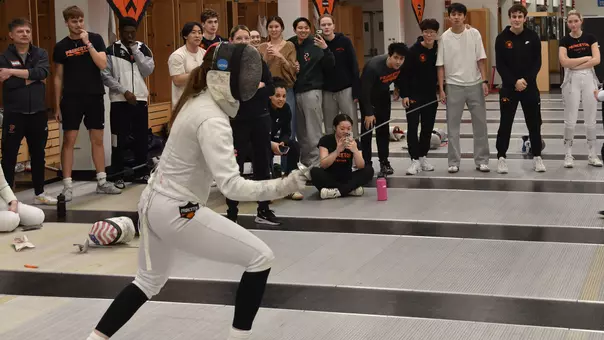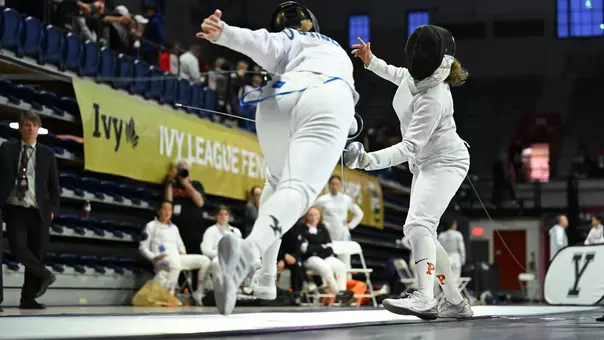Princeton University Athletics
John Doar: Doar Prize
August 01, 2000 | General
JOHN DOAR '44:
He was born in the early Minnesota winter of 1921, in a time and place that did little to suggest what road lay ahead. He came into the world amid thoughts of snow and cold and soon Christmas, and then he began a lifetime spent bringing peace on Earth and goodwill to man on some the nation's hottest, dustiest back roads.
John Doar grew to be a man who first studied history--and played basketball--at Princeton and then went out and made history for others to study. Today, nearly 80 years after his serene beginning, he stands as one of the most accomplished graduates Princeton has ever produced.
"His life has been in those nothing motels on the highways or in the dirty-windowed hotels of the small cities," Pulitzer Prize-winning writer Jimmy Breslin wrote of him. "It has been spent with people afraid to help him or with people who think about shooting him, in courtrooms where you can't win and with politicians who will not listen."
He walked away from easy street to walk down the main streets of the greatest threat to the domestic tranquility this country has seen since the Civil War. He did so, at great personal risk, not because of money or to get his picture in the newspaper or his name in a history book.
He did so for one reason, the only reason necessary.
"It was," he says now, four decades later, still hard at work at 7:30 in the morning, "the right thing to do."
It is not too much of a stretch to say that John Doar did as much for racial equality in this country as Abraham Lincoln, as Martin Luther King, as Jesse Jackson. An unassuming man from as north as you can get, Doar was at the forefront of the civil rights movement of the 1960s, and his fingerprints are on every great milestone of that era.
"It was a caste system," he says. "Pure and simple. Cradle to grave. There was a first class and a second class, and it wasn't right."
And it all started so far away from all of that. John Doar grew up in the middle of the Depression, untouched by it for the most part. His father was a country lawyer, his mother was a schoolteacher. He grew up 50 miles outside of St. Paul in the town of New Richmond in northwest Wisconsin.
"My mother didn't think the local school was good enough, so my brother and I went to a country day school in St. Paul," Doar says. "We lived in a rooming house down the street from the headmaster. We shoveled his walk, and he drove us to school. We went home on the weekends. It was a good education."
The young Doar was a good athlete, and his favorite sport was basketball.
"The school was a hockey school," he says. "They didn't have a basketball program. I played intramural basketball with the 15 other guys in the school who couldn't play hockey. When it came time to go to college, I had never played one minute of organized basketball. I figured I wasn't good enough to play at Dartmouth, so I went to Princeton."
Dartmouth was a national power in the early '40s, while Cappy Cappon was in the early stages of building Princeton into the basketball dynasty it would become.
Doar made the basketball team at Princeton and averaged 7.1 points per game as a junior in 1942-43. The Tigers, who would finish 14-6 that year, were led by players like Bud Palmer and Butch van Breda Kolff.
Doar then left after his junior year for military service, eventually training as a bomber pilot. The war ended before he had a chance to be deployed.
After that he returned to Princeton for his senior year, when he averaged eight points per game for his first 10 games before his season ended with a broken hand. He may have been winding down his collegiate career, but his education was just beginning.
"I knew a lot of fellas from the South at Princeton," Doar says. "I was a member of Tiger Inn, and we had a lot of Southerners. They were good guys. Occasionally we'd talk about issues of segregation and race. These guys would say that they knew they had a problem, but that they had to fix it for themselves. They always said that having any Yankees come down there would just make it worse. After the war one of the fellas asked if the Tiger Inn guys would consider taking a black guy in the club, and it was 50-50. Nothing really came of it."
With this introduction safely stored away, Doar left Princeton and headed west to law school at the University of California. From there it was back to Wisconsin, where he joined his brother and cousin (Warren Knowles, who would serve two terms as governor of Wisconsin) in the family law practice when his father became ill. He would stay 10 years.
"Then I looked around late in 1959 and became conscious from newspaper articles and magazines that nothing had happened with segregation since I left Princeton," he says. "A friend of mine called me and asked if I'd like to go to work for the Justice Department, in the Civil Rights Division. It didn't take me long to say I'd do it. I moved my family to Washington on July 4, 1960."
At the time the entire staff consisted of four lawyers. The early '60s were a time Doar spent crisscrossing the South, working through the judiciary branch to pass and enforce laws promoting racial equality. The staff of his division quadrupled, and their efforts resulted in some of the greatest social gains in the history of the country.
Along the way Doar was the point man on several epic projects. In 1963 he successfully prosecuted seven men accused of murdering three civil rights workers in Mississippi. He was at the front of the legendary civil rights march from Selma to Montgomery in Alabama. His work in the first half of the decade led Congress to pass the Voting Rights Act of 1965, which eliminated all traditional hindrances to registering black voters. Within one year a quarter of a million new black voters in the South had registered.
Perhaps his most dangerous role in the South came in 1964, when he personally took James Meredith to desegregate the University of Mississippi.
"They had taken Meredith up there once, and they had been turned away," Doar says. "The president and the attorney general were determined he was going to get into that university. I went with him the next time, and we were turned away. On the fourth trip we got in. That night there was a riot. I lived with him for the next few weeks."
After nearly eight years of being on the road more than 200 days a year, Doar left the division to work on a project in the Bedford-Stuyvesant section of Brooklyn.
"Robert Kennedy asked me to work there," Doar says. "Three or four months later, he was killed. I felt I owed it to him to stay, he had done so many good things for me. I stayed for six years."
At that point New Jersey Congressman Peter Rodino called Doar to become part of another dramatic moment in 20th century history, the investigation into the possible impeachment of Richard Nixon after the Watergate scandal. Doar, a lifelong Republican, became chief counsel for the House Judiciary Committee.
Once his impeachment became an inevitability, Nixon resigned in August of 1974. Doar then returned to private practice, where he still works today.
"I'm still trying to do my best," he says.
His best has been more than good enough. It has changed the world.
"My personality is such that I never needed to talk to a newspaperman," he says. "I didn't need to see my picture around. I didn't need to leak anything to anyone. I just was part of a hard-working group of people who had a spirit grounded in hope. It was the kind of spirit where you do things not because of the likelihood of success but rather because they're the right thing to do."
by Jerry Price




